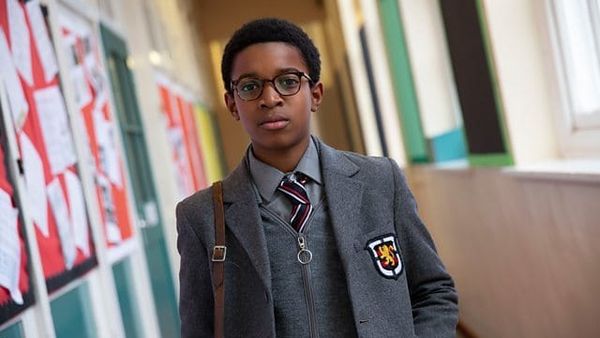Eye For Film >> Movies >> Education (2020) Film Review
Education
Reviewed by: Anne-Katrin Titze

“These are the stars of Andromeda!” Education, the fifth episode of Steve McQueen’s 2020 Small Axe anthology (Mangrove; Lovers Rock; Red, White and Blue; Alex Wheatle), co-written with Alastair Siddons, sets the tone in outer space. This is a film about strong, formidable performances by women (Sharlene Whyte, Naomi Ackie, Josette Simon, Jo Martin, Tamara Lawrance), whose characters take on the systemic wrongs and grinding injustices imposed upon the children in their community.
Twelve-year-old Kingsley Smith (Kenyah Sandy) visits the planetarium with his class and knows then and there that he wants to become an astronaut. In school, they read John Steinbeck’s Great Depression novella Of Mice And Men. When it is Kingsley’s turn, he remains silent. He is called a “big blockhead” by his teacher (Sam Fourness) and his mainly white classmates laugh.

Later, during a music lesson, his harmless acting up is judged “unacceptable” by his prowling and growling teacher Mr. Hamley (Nigel Boyle). While his white friend’s clowning is barely reprimanded, Kingsley is taken to see the headmaster (Adrian Rawlins), who has his own plans. Kingsley’s mother Agnes (Sharlene Whyte) is informed that her son scored below average on the IQ test and that it would be best to send him to a “special school”.
McQueen builds his scathing criticism of the 1970s British school system in layers. Resembling the “beautiful spiral constellation of Andromeda” that set the little protagonist dreaming, the film returns to the diverging realities and tropes. We see Kingsley’s mother working two jobs, as a nurse on nightshift and cleaning stairs in a private home. His father Esmond (Daniel Francis) is a carpenter, both are unsuspecting of the informal segregation policy at play that is about to doom their child.
Kingsley confides in his 18-year-old sister, Stephanie (Tamara Lawrance), who wants to become a fashion designer, that he is going to be sent to “a stupid school.” The siblings both come across as good kids, praying for their hopes and dreams to come true one day, but the entrenched system makes this almost impossible.
The warning signs mount. Why does the brochure for the new school point out that it is “first and foremost a school”? Adding insult to injury, a pea soup-green bus picks up the “special” students daily from their old schools. Two of Kingsley’s former classmates and friends, Joseph (Ryan Masher) and Sajid (Jairaj Varsani) can’t resist teasing him when he is shipped off. The understanding bus driver (Kemal Sylvester) protects Kingsley from further embarrassment. He clearly has seen these dynamics play out many times before. The devil is in the details for McQueen. As expected, the terror is only just beginning.
Among the new arrivals with Kingsley, biding their time in a hellish holding waiting room with no education whatsoever going on, are little Sheila (Tabitha Byron), who only makes animal sounds, and Nina (Aiyana Goodfellow), whose only reason of being in this “school” seems to be that she doesn’t identify as Black.
A “teacher” Miss Gill (Kate Dickie) sends the kids out into the yard to play on their own after class and calls it lunch time. Others don’t show up at all or, as does Mr. Baines (Stewart Wright), practice their own hobbies. McQueen goes for absurdity to get the point across, otherwise it would be too painful. Mr. Baines plays the guitar and sings House Of The Rising Sun for a sheer endless five minutes. He keeps stopping, giving us hope, then starts with a new verse. The pupils are catatonic, sleep, or draw a cartoon of their teacher behind a lifted desk lid.
Help shows up in the form of Hazel Lewis (Naomi Ackie), a spy to check out what is really going on. She is a psychologist and part of a group of West Indian women intent on changing the unfair system. Lydia Thomas (Josette Simon) arrives unannounced at the Smith household, determined to open their eyes and armed with a small book by Bernard Coard, titled: How the West Indian Child Is Made Educationally Sub-Normal In The British School System.
At a town hall meeting for parents Agnes is invited to, the “deeply rooted cultural bias” in the IQ tests is being discussed and plans for action take shape. An older gentleman stands up and says that he never went to school to learn to read and write. But this is not why he is addressing the group. It is the fact that he knows of kids that spent “12 years in school and can’t read or write!”.
The small axes are powerfully set in motion. To help Kingsley, Mrs. Smith will have to write to the newly appointed Secretary of State for Education and Science. People are hopeful, because it is a woman. Her name is Margaret Thatcher.
Education, which began with the Galaxy named after a female figure of Greek mythology, Andromeda, the “ruler of men”, ends with Amina of Zaria, a powerful warrior princess, who ruled in the 16th century over what is now Nigeria. Mrs. Tabitha Bartholomew (Jo Martin), a top-notch educator, serves wisdom and breakfast in her house during the Saturday supplemental classes, where she teaches children math and about Black history. “What do you all know about our ancestors?” she asks. “That we were slaves,” a girl responds. “That’s what they want you to know,” and “nothing of the richness of the cultures,” Mrs. Bartholomew explains. This is her cue to embark on the journey to the great kings and queens of African folklore.
Storytelling and history let us understand who we are and who we can be. Science and legends, outer space and the inner realm of the imagination don’t contradict each other. Deliberate dulling of the spirit of a child is a crime. As Simeon in Alex Wheatle points out: “You have to supplement what they teach you, by teaching yourself. You have to unlearn what you have learned.”
Reviewed on: 07 Dec 2020














